|
2 Beaver Road
South Ashford
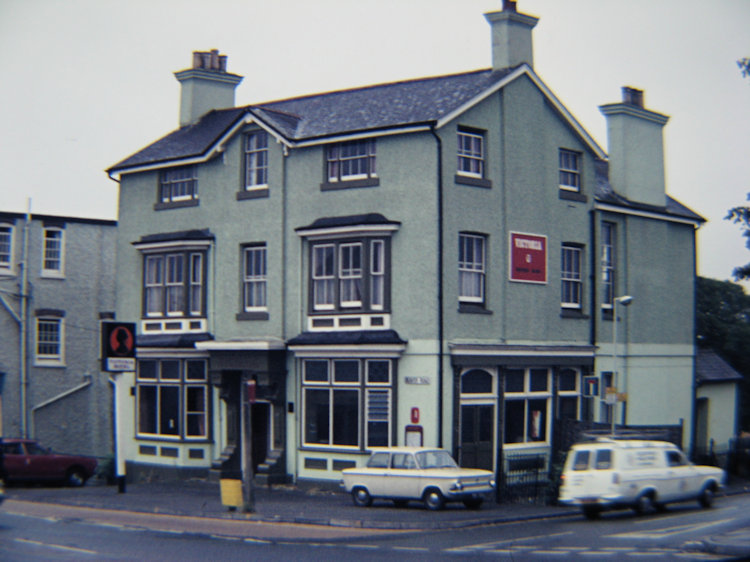
Above photo, 19 August 1975, by Jim Ashby. |
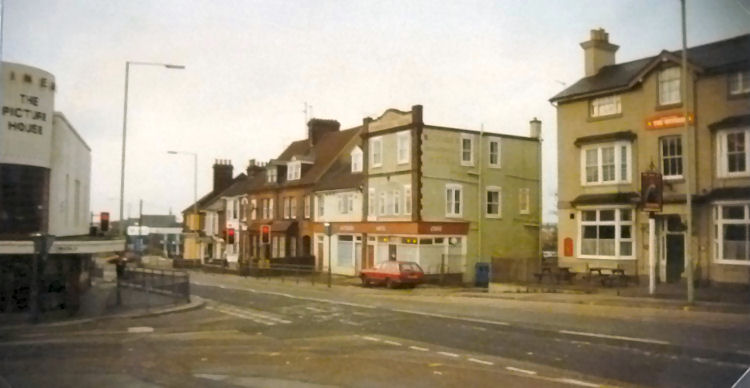
Above photo, circa 1983, kindly sent by Allan Ward. Also showing
the "Butchers"
centre. |

Above photo kindly sent by Chris Excell, 23 January 1983. |

Above photo, date unknown. |
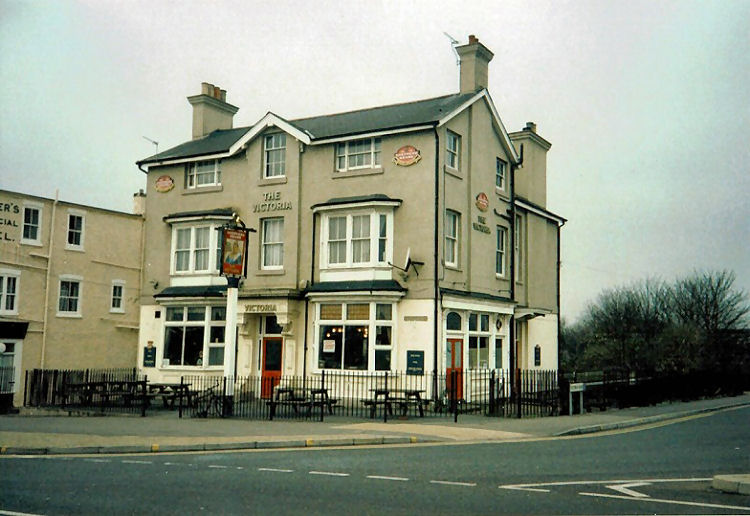
Above photo, circa 1994, kindly supplied by Rory Kehoe. |
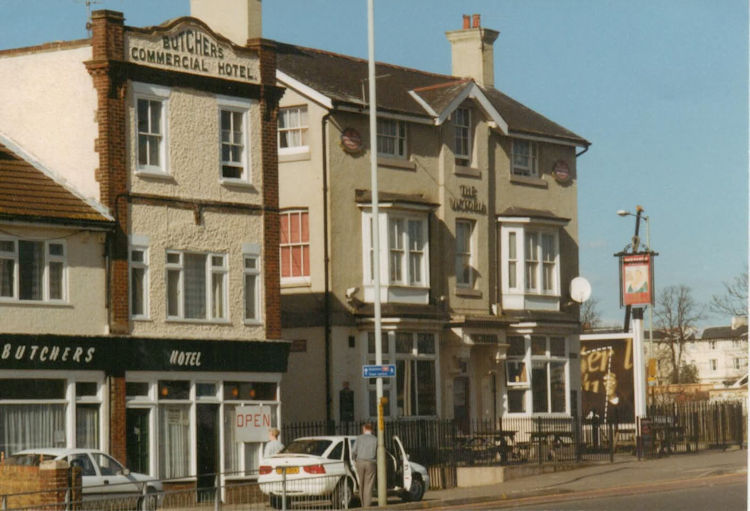
Above photo, date unknown, also showing the "Butchers
Commercial Hotel" (Left). |
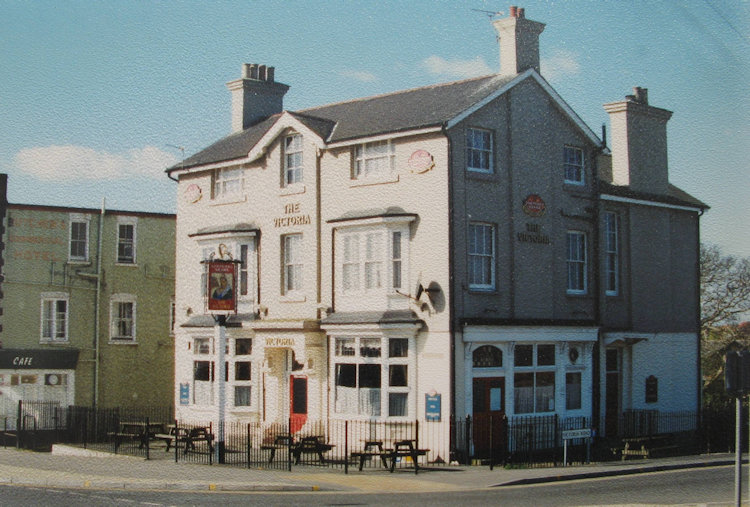
Above photo, 28 March 1997, by Jim Ashby. |
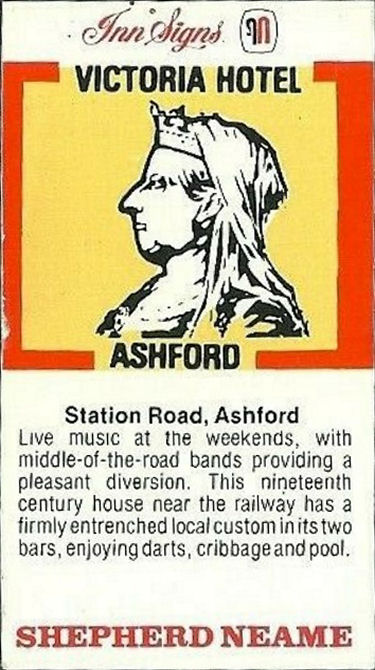
Above card from the Shepherd Neame Inn Signs Passport 1982. |
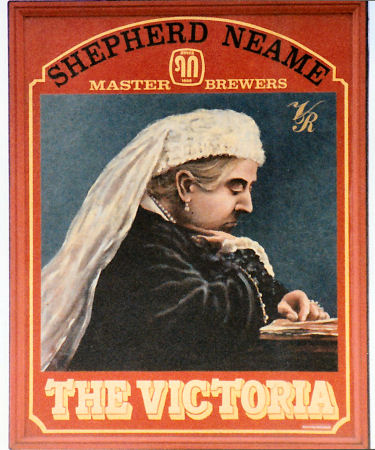 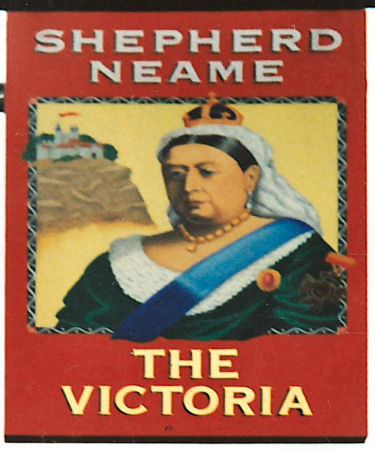
Above sign left September 1991, sign right June 1992.
Above with thanks from Brian Curtis
www.innsignsociety.com. |
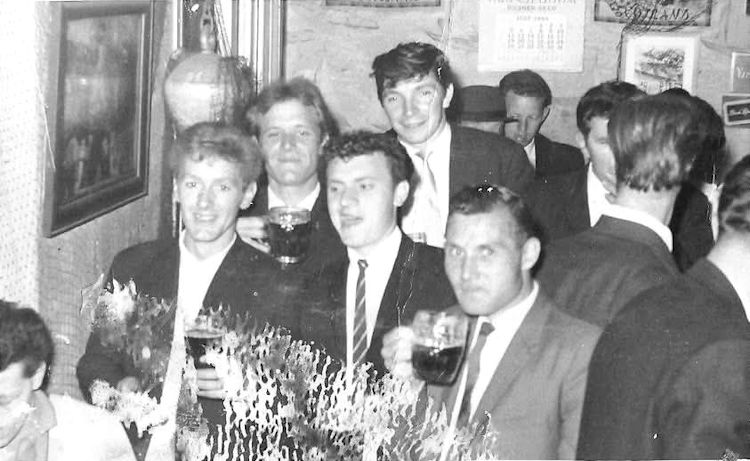
Above photo, date unknown, showing Tony Weston, tall man at middle back. |
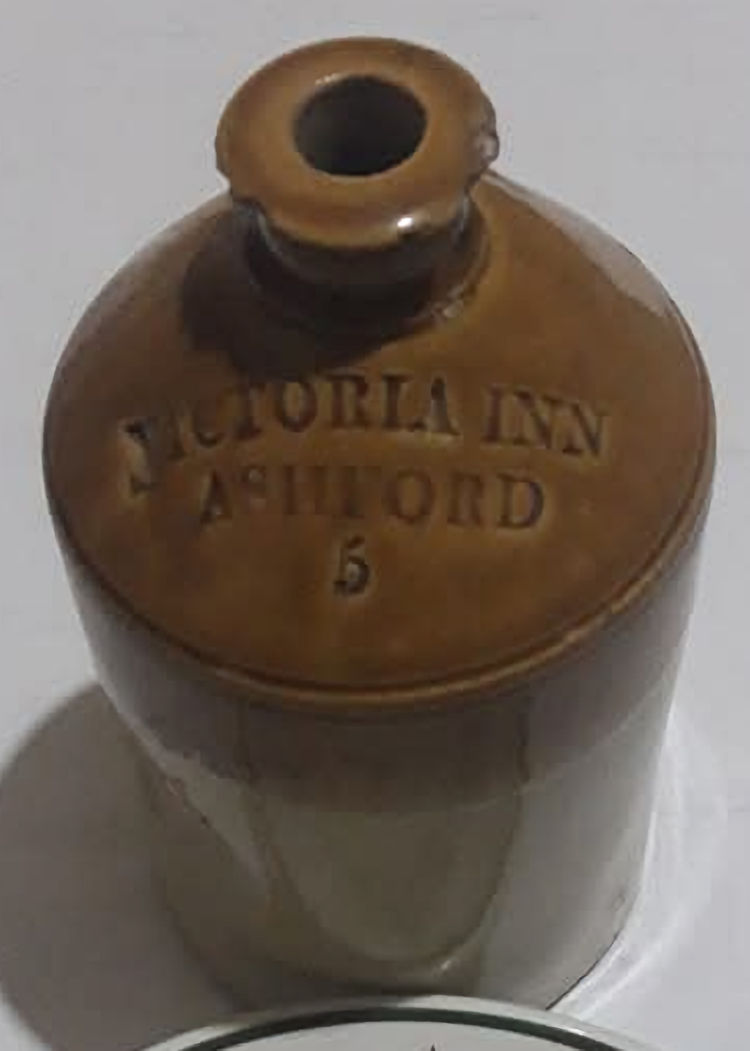
Above 1/4 gallon flagon, date unknown. |
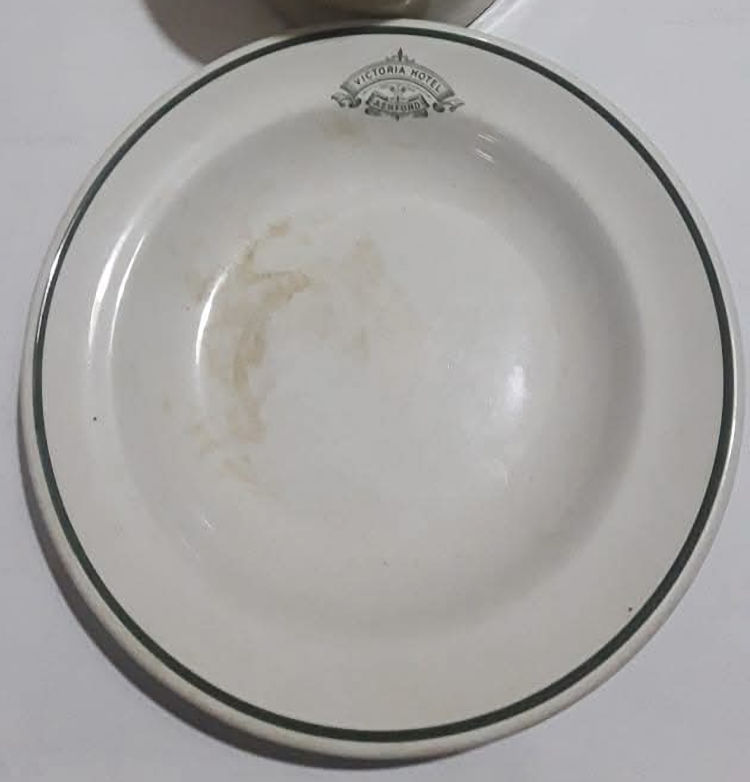
Above dish, date unknown motif saying "Victoria Hotel, Ashford." |
|
|
|
From the Kentish Express, 14 June, 1856.
Ashford Petty Sessions. Saturday, June 7.
Before J. B. Wiklman, Esq., (chairman) the Rev. J. Dufton, W. Burra,
H. W. Carter, E. H. K. Hugesson, and G. E. Sayer, Esqs.
Alleged Robbery:- Harry Knightley and Mary Ann Shore were charged
with stealing 6s. 6d. from the person of Thomas Foley, of Ashford.
Prosecutor deposed:- I met the prisoners at the New Town yesterday,
and sold the male prisoner two umbrellas for a shilling. I came from
there in company with them as far as the "Victoria," where we had
something to drink; while there, the female prisoner put her hand in
my pocket and took out the money, which she handed to the other
prisoner. I came into the town for a policeman, and on my return to
the "Victoria," found the prisoners were gone. I afterwards found
them at the "Marlborough," and taxed them with the robbery, which
they, denied. I then went for Superintendent Fancett, who took them
into custody.
Superintendent Fancett deposed to receiving information of the
robbery, and taking the prisoners into custody; when they were
searched, a two shilling piece and a shilling were found on the man,
and a penny on the woman. Before searching the prisoners he asked
prosecutor what sort of money he had lost, when he said, a bright
two shilling piece, four shillings, and a sixpence. Prosecutor was
the worse for liquor.
The prisoners denied all knowledge of the robbery, and said
prosecutor was treating every one that came into the room; he also
lent three shillings to a sweep, with whom he afterwards quarrelled
and fought.
The chairman said the bench were of opinion that this was no case to
go before a jury, and the prisoners were discharged.
|
|
From the Kentish Chronicle, 4 July, 1863.
A STRANGE DELUSION.
On Tuesday, a stalwart man named Henry Leeds, belonging to Ashford, said
to be an ostler, was brought before the Ashford magistrates, under the
following circumstances. It seemed that he had started from the “Victoria
Inn,” Ashford, on the preceding day, and ran off into the country over
fields and hedges and through King's Wood, for a distance of 25 miles
and upwards, and wound up by undressing himself on the lawn in front of
Sir Courtenay Hollywood’s residence, Evington. The man gave very
collected answers to the magistrate’s questions, and stated the circuit
he took and the different parishes he went through. He alleged that
several men were pursuing him with the design of flogging him; and that
whenever he paused he could hear them running after him and expressing
that intention to each other. Two of the men appeared to be keepers
belonging to the lunatic asylum. He added that he did not know any one
was living in the house opposite which he undressed
or he should not have done so.
It is almost needless to say no one had been running after him. He had
been sent on three different occasions to an asylum and was sent from
Cranbrook six or seven months since.
The Bench made an order for his removal to Barming Heath.
|
|
From the Southeastern Gazette, 2 January 1866.
VICTORIA HOTEL, ASHFORD, close to the Railway Stations.
Licensed to Let Flys, Dog Carts, &c
|
|
From the Kent and Sussex Courier, 11 May, 1901.
SUICIDE IN THE FOLKESTONE EXPRESS.
On the arrival of the Folkestone express at Ashford about noon on Monday
a ticket inspector found in a first-class carriage a gentleman bleeding
from the right temple and in a dying condition. He was removed to a
waiting-room, where almost immediately he expired.
On the body were found visiting cards inscribed "J. Reginald Trollope,
17, Eaton Square, London," a gold watch and chain, and a considerable
sum in notes and gold. There was a new Colt revolver in the carriage
with one chamber recently discharged.
On Inquiry at 17, Eaton Square it was ascertained that Mr. Trollope was
a gentleman of independent means. His health for some time past had not
been satisfactory, and on Saturday he suddenly announced that he would
proceed to Folkestone until Monday for change of air.
An inquest on the body was held by the East Kent Coroner (Mr. R. M.
Mercer) at the "Victoria Hotel," Ashford, on Tuesday.
Robert Gerald Trollope, living at 17, Eaton Square, London, identified
the body of the deceased as that of his brother, John Reginald Trollope,
who was a builder, aged 38. He was a bachelor. He went to Folkestone for
the week-end. Deceased had not seen a doctor since the 26th March, and
then for rheumatism.
Thomas Rossiter gave evidence to the effect that he found the body of
the deceased in a 1st class railway carriage. There was a wound on the
deceased’s head.
George Willmott, station-master at Ashford, stated that he was called to
the carriage in which the deceased was found. He found a revolver close
to the deceased's feet. There was also a kit bag, a stick, and an
umbrella, and two coats and a hat in the carriage. He had the deceased
removed to the waiting room, and Dr. Atkinson was sent for.
Police Sergeant Brooks stated that he found a pocket-book containing two
£5 notes, some visiting cards, and some notes, a gold watch and chain,
£2 6s. 2d., and other small effects. He also found a 1st class return
ticket from Folkestone to Charing Cross, issued 4th May, and a first
class from Harbour to Central, issued 6th May. There was a box of
Cartridges in the bag and the revolver was a "Colt." Dr. Atkinson stated
that he was called to the railway station at 12.55. On going there he
met deceased being carried into the waiting room on a stretcher. He was
totally unconscious and blood was freely flowing from a wound in the
right temple.
The revolver must have been placed within an inch or two of his temple,
and the wound could have been inflicted by his own right band. He died
at 1.20.
The jury returned a verdict of Suicide, but that there was no evidence
to show the state of deceased's mind.
|
|
From the Whitstable Times, 15 February, 1902.
KILLED ON THE LINE.
The East Kent Coroner (Mr. R. M. Mercer) on Saturday evening held an
inquest at the “Victoria Hotel,” Ashford, touching the death of Horation
Capeling, a labourer at the Ashford Gas Works, and who lived at Great
Chart and was killed the previous afternoon. The deceased, who was 51
years of age and was a married man with one son, had been “queer” in the
head at times, and on Friday afternoon he got in front of the 2.40
Ashford to London express between Daniel's level crossing and Chart
Lencon bridge, with the result that he was killed, a leg being cut off
and death quickly following. Close to the spot is a bricklayer's hut,
and it appears as if the deceased must have waited in it until the train
was almost opposite and then stepped in front of the engine. A verdict
of “Suicide during temporary insanity” was returned.
|
|
From the Whitstable Times, 10 May, 1902.
CUT TO PIECES ON THE RAILWAY. STRANGE CASE.
The East Kent Coroner (Mr. R. M. Mercer) held an inquest at the
“Victoria Hotel,” Ashford, on Thursday, touching the death of George
Henley Washford, a married man, of forty years of age, a painter by
trade, who resided at 7, Linden Road, a new thoroughfare off the Hythe
Road, Ashford, and who was employed in the South-Eastern Railway Works.
The deceased was run over by a train near Finn Farm, Kingsnorth, on
Friday evening, his body being literally cut to pieces.
Henley George Washford, a youth and son of the deceased, was the first
witness, and he, after giving the necessary formal evidence as to
identification, was questioned as to the movements of his father the day
before and the morning of his death. According to the son the deceased
returned from France on Sunday evening, he as a good workman often being
sent to the other aide of the Channel by the Company to do special jobs.
On Sunday night he slept with his son (the witness) who is working as a
photographer at Mr. De’Ath’s, Bank Street. On Monday deceased went to
work, and again slept with his son that night, and in the morning when
he was going to his work at about five minutes to nine the son left his
father in bed. Between nine and ten Mrs. Washford noticed deceased go
downstairs and out of doors, and told her son after the fatality that
she thought he took some bread and cheese with him. From this time until
Driver Atkinson saw him standing in “the four foot” the deceased's
movements were entirely lost sight of.
Sergeant Brooks, who had charge of the case, was closely pressed by the
coroner as to the inquiries he had made, and he assured Mr. Mercer that
the whole district had been thoroughly scoured, every public house
visited, and a sister of deceased’s, at Ruckinge, and an uncle at
Kingsnorth questioned, but without finding the slightest trace of the
unfortunate man’s movements during the day.
An additionally painful part of the case was the story of the home life
of the deceased, the son admitting that there had been many “rows,” and
stating that his mother had not spoken to his father since his return
from France. Upon his return from Franca the deceased was, said his son,
very much the worse for drink, “and at times chronic,” the gist of this
part of the witness's evidence being that his father was greatly
addicted to drink. Mr. Holly, deceased's foreman, however, said that he
had known deceased for 17 years as a sober, steady man, and that he had
never known him to lose a day's work through drink, while Mr. W.
Waghorne, one of the jury, and another juror stated that they knew
deceased intimately and that he was never the worse for drink.
The Coroner and some of the jury, in view of the lack of information as
to deceased's movements, at first favoured an adjournment, but Driver
Atkinson, in reply to one of the jury, having stated that there was time
for deceased to have got out of the way when he blew his whistle, twelve
of the jury returned a verdict of “suicide during temporary Insanity.”
The thirteenth member of the jury dissented, stating that he was not
satisfied that it was a case of suicide, but the coroner accepted the
verdict of the twelve, that being a sufficient number. During the
inquiry it transpired that there were three children at home, aged
respectively 15 years, eight years and three years, and that Mrs.
Washford was too ill to attend.
|
Richard Ticknall kindly informs me that it was demolished in the early
2000s for roundabout/road development by International railway station.
LICENSEE LIST
WENBORN James 1858+
BODLE Robert Underdown 1861-62+ (age 30 in 1861 ) )
ROSSITER Thomas 1874-01+ (age 64 in 1901 ) )

https://pubwiki.co.uk/Victoria.shtml
http://www.closedpubs.co.uk/victoria.html
 From the Kelly's Directory 1903 From the Kelly's Directory 1903
 Census Census
|












